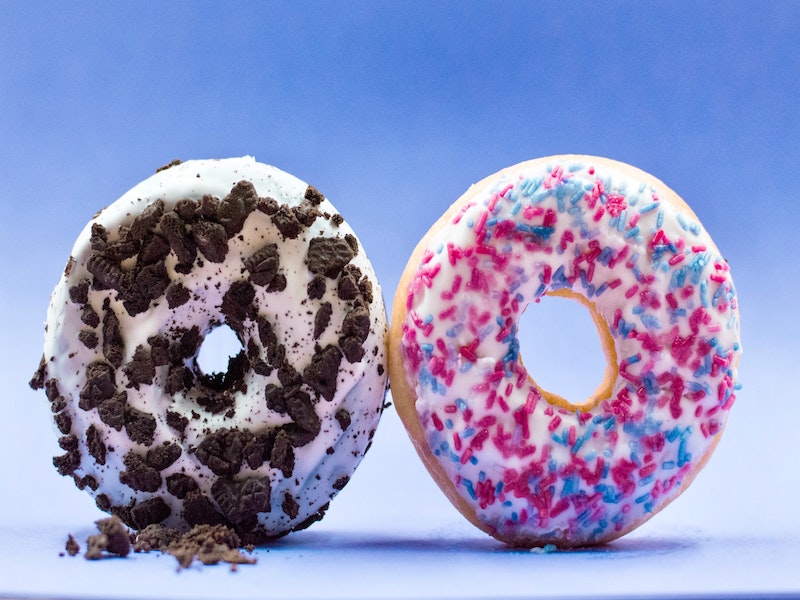Searing heatwaves, entire nations abandoned and stagnant seas. These are just a few of the outcomes we can expect from global heating of 4C, and it’s all predicted to take place in a few decades. Faced with such a terrible future, a thought I often have is why do we keep on behaving the same way, when we know doing so is leading to catastrophe? Eating doughnuts can help explain why.
Eating a doughnut is an unbridled delight. I mean, look at how good they look. Who doesn’t begin to salivate at the sight of one of those sweet-filled, round bundles of joy?
There is no harm in eating a doughnut now and again. But if the doughnut stops becoming a treat and starts becoming a part of your daily diet, you’ve got yourself a problem.
Yes, that doughnut is delicious, but as with every joy in life, we must do things in balance. If we don’t, our lifestyle choices will have deadly consequences.
According to the World Health Organisation, heart disease is the world’s biggest killer. In 2016 alone, nearly ten million people died from what can be a correctable disease. Some of the leading causes of heart disease include an unhealthy diet, lack of exercise, being overweight and smoking.
The doughnut represents the tension between what we need to do and the fear of what we would have to give up by doing so.
The long term effects of making terrible lifestyle choices result in premature death. You would never think this at the time your eyes are drawn to the glowing doughnut. But a bad diet is a killer, and eating doughnuts every day represents a high sugar diet laden with saturated fats.
Swimming with sharks
Imagine a doctor told you at the age of 20 that if you continue eating decadent, high sugar, processed foods, you’ll die of heart disease at the age of 56. Would the threat impel you to change your behaviour? For some, it might, but our psychology is terrible at dealing with anything too far in the future. Being told you’ll die in 36 years if you keep on doing what you’re doing doesn’t create the necessary psychological response that triggers an effective reaction.
Now imagine you were swimming in the ocean and you saw the fin of a shark. The thought of it alone is enough to make anyone’s heart skip a beat. Upon seeing the fin, you would immediately know you’re at risk of being eaten alive. In the situation, how would you react? Would you lie back, enjoying the feel of the rippling waves brushing over your face? Of course not. The shark would compel an immediate response.
When faced with an imminent threat, our bodies trigger a fight or flight response. Fight or flight is a primary human survival mechanism that allows for rapid responses to life-threatening situations. It’s an instinct the Harvard Medical School argues is vital for survival.
Our response mechanisms mean we’re naturally predisposed to react to immediate threats. The downside to our biology is we’re bad at dealing with problems if the problem is decades down the line.
The thought of being eaten alive is enough to make your stomach churn. But while films like Jaws have done much to cement an idea of sharks as bloodthirsty savage killers, the reality is on average four people die from shark attacks each year.
The climate crisis is like an unhealthy diet
It’s far likelier you’ll die from an unhealthy diet than a shark attack. But our psychology means reading how much more likely you are to die from heart disease than a shart attack won’t trigger a change in people’s lifestyle choices.
Hang on, though, what does any of this have to do with the climate crisis? A lot, as it happens. Like that doughnut, the lifestyle choices we tend to enjoy the most create the largest emissions of carbon dioxide.
Going on holiday, buying a new smartphone, keeping up with the latest fashion. In our consumption fuelled society, there are doughnuts everywhere we look. And we all indulge in these choices because they make our lives more comfortable, more enjoyable and more convenient.
The irony is, the more carbon-intensive your lifestyle is, the better it is for our economy. It is a carbon-intensive life that keeps the wheels of the capitalist system going. So we’re all encouraged to continue leading a high carbon, decadent lifestyle, while at the same time being told we need to stop leading that lifestyle.
Scientists told us long ago if we don’t wean ourselves off of our fossil fuel addiction, the effects of our behaviour will lead to disaster. It’s like the doctor telling you if you choose a sugar-filled lifestyle, you will die at the age of 56. Being told the climate could rise by 4C by 2100 sounds awful. But, you’ll soon forget as in the here and now it doesn’t feel like we’re diving deeper and deeper down a hole.
While each day seems the same as the last, it is the accumulative effect of our everyday behaviour that is leading us to catastrophe. Small daily choices are creating one massive problem.
A light jog
No one wants to give up the fruits of a carbon-intensive lifestyle. Certainly not the businesses who make so much money out of it. Nor the super-elite who benefit from the fabulous wealth a consumer-centric society creates.
And so companies and governments alike are presenting an image of change. Every company is jumping on the green bandwagon because it makes for great PR. The small tweaks these businesses are making give the impression they are solving the problem.
The reality though is to solve the problem what’s required is a wholesale change of our economy and the beliefs feeding it. The changes being made are small in comparison, and won’t create the necessary transformation required.
After all, these companies don’t want the economy to transform, because they reap the rewards of consumer-centric capitalism continuing. Transforming our economy could reduce their revenue streams. And no one wants that now.
It’s like the doctor telling you after years of abusing your body that you need to stop eating doughnuts right now to reduce your risk of heart disease. Instead, you go for a light jog every couple of days, and as soon as you get home, you munch on a doughnut as you feel like you’ve earned it after your jog.
We need to give up the doughnut
The doughnut represents the tension between what we need to do and the fear of what we would have to give up by doing so. Everyone has become so used to the creature comforts a carbon-intensive lifestyle affords, that it’s unthinkable to give it all up. Like that sugar high, a carbon-intensive lifestyle is incredibly addictive.
No one wants to give up the standard of living a carbon-intensive lifestyle provides. So we make veiled attempts at solving the problem, sometimes we might even burst into a sweat. But not only does the problem remain, every second of every hour of every day it is getting worse.
It may not be want you to want to hear, but this is the reality we’re facing.
And the sprinkles on top? Well, the problem is made worse by the fact everyone behaves the same way. Meaning it doesn’t feel like anyone is doing anything wrong. If everyone else is eating doughnuts every day, then why can’t I? The issue with our behaviour won’t even register, because it’s a normalised part of life to continue behaving that way.
The psychology of the climate crisis is what makes it such a monumental challenge to solve because each one of us is part of the problem. Like the person enjoying their doughnut, we’re all terrible at looking at the knock-on effects of our behaviour. And this is the reason why motivating people to do the right thing is so tricky because we’re always living in the moment—not planning for 50 years ahead. Yes, we are causing our destruction, but it doesn’t feel like we are. And because it doesn’t feel like there’s a problem, it becomes all too easy to continue munching on doughnuts.



